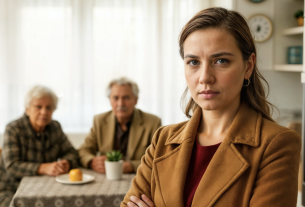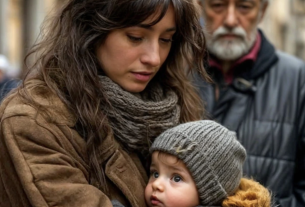Lidiya Viktorovna woke up in the silence of the early morning, wrapped in an inexplicable feeling of anxiety—dull and muted, just like every year when spring awakened from its winter slumber. This feeling accompanied her every spring for twenty-three years now. It came with the first rays of light, as if warning that this day was coming again—the very day that changed her life forever.
She was a tall, slender woman whose dark hair had gradually started to silver, taking on a noble gray. Every morning she woke with a thought that never left her for a minute: “Another day without them.” Lidiya slowly got out of bed, as if heavy memories weighed on her shoulders. Barefoot, she stepped onto the cool floor, then went to the balcony to look out at the city, which was also beginning its new day.
Outside the window, the April sun played on the rooftops, the trees were just starting to dress in green, and the air was filled with the faint scent of blooming apple trees. The city seemed alive and beautiful, but for Lidiya, it was only a backdrop—a pretty picture that stirred no emotion. Her soul remained empty, locked in sorrowful memories.
Brewing herself a strong coffee, she stepped out onto the balcony, wrapping her robe tighter around her. Through the warm cup in her hands, she felt a pleasant heat, but it could not warm the icy loneliness inside. Spring was in full swing, but for her, it always symbolized pain. Because it was in spring, on April 23, that the event happened that shattered her world.
“That date is approaching again…” she whispered, looking into the distance where the sun slowly rose above the horizon.
She recalled the faces of those she loved more than life: Grigory—her faithful, caring husband—and little Fedya, a two-year-old angel with curly hair and eyes full of trust. She remembered how they left that morning—Grigory was going shopping and decided to take their son along. An ordinary family trip turned into a terrible tragedy. At a crossroads, their car collided with a vehicle driven by a drunk driver. The impact was so powerful that the car literally tore apart.
They found Grigory immediately—he died on the spot. And Fedya… Fedya was never found. All cameras showed the child was in the car, but after the crash, his trace disappeared. No bodies, no evidence. Only torturous uncertainty that haunted Lidiya all these years.
Twenty-three years. Thousands of missing-person posters, hundreds of meetings with law enforcement, countless nights spent in tears. She couldn’t accept the thought that her son might be alive. Or, conversely, that he was dead but without a grave, without a final word, without a chance to say goodbye. For Lidiya, this became eternal torment—living in a state of painful hope and suffocating fear at once.
But there was no way out. She found salvation in work. By nature, Lidiya was always a workaholic—organized, responsible, able to control her emotions even in the hardest situations. After the tragedy, work became her only anchor in reality. During the day, she saw patients as a district doctor; at night, she responded to emergency calls, helping others while she herself found no peace.
Her colleagues respected her professionalism but looked at her with sympathy. Especially the chief doctor—Ilya Davidovich—a man with a soft voice and kind, understanding eyes. He often tried to talk to her, urging her to slow down just a little.
“Lidiya Viktorovna,” he said once after another night shift, “you understand this can’t go on. You work for three, barely sleep, eat on the run. And what if Fedya is found, and you…”
He didn’t finish, but Lidiya understood. Those words touched something deep inside. It was then she realized she had no right to give up. Not because someone demanded it—but simply because she had to be ready to meet her son if he ever came back.
On weekends, she went to the cemetery to Grigory’s grave. She would sit on the bench beside the monument and talk to him as if he were alive. She told him everything—about work, her fears, how much she missed them.
“Grisha, I’m so tired of searching,” she whispered, looking at his photo. “But I can’t stop. What if he’s nearby? What if he’s waiting for me?”
And this spring, something changed. For the first time in many years, Grigory began to appear to her in dreams. He came in the form of the man she remembered—silent but anxious. They were in the old apartment where they had lived before the tragedy. He looked at her with long, mute eyes, as if trying to say something.
The dreams repeated several nights in a row. And every time—the same: silence, anxiety, tension. But in the last dream, Grigory spoke:
“Lida, I beg you, hurry! Time is almost up.”
“What do you mean?” she asked, squeezing his hand in her dream.
“You’ll understand. Just don’t miss the moment.”
Waking up, Lidiya couldn’t calm down for a long time. Her heart pounded as if she had really heard the voice of her beloved. The scent of his cologne, mixed with the aroma of old books and leather, stayed with her for several minutes after awakening.
The next day, an unexpected message awaited her. The shift supervisor—strict but fair Gennady Nikolaevich—told her that her regular partner, Mikhail Petrovich, had broken his leg and would be off duty for several weeks.
“You’ll have to work with Oleg Naumovich,” he added, looking carefully at Lidiya.
Her heart clenched. Oleg… This man was part of her distant past. A former police major, a stately man of fifty-two with piercing gray eyes and a determined gaze. Once, five years after the tragedy, intimacy had grown between them. Lidiya mistakenly thought the pain was fading, that she was ready for a new relationship.
But guilt before the memory of her husband and son was stronger than anything. She abruptly ended things, explaining that she wasn’t ready for a serious relationship. Oleg accepted the decision silently, but the pain in his eyes stayed with her for many years.
“Maybe there’s someone else?” she asked, trying to keep a calm expression.
“No one, Lidiya Viktorovna. Oleg is an experienced paramedic. Besides, personal matters shouldn’t interfere with work.”
Their meeting was restrained. He greeted her briefly; she answered the same. Both understood they had to work together, despite the past.
The very first call was an emergency. The dispatcher gave the address of the restaurant “Albatross” and brief information:
“Wedding, groom feels unwell, lost consciousness. Suspected anaphylactic shock.”
Oleg confidently drove the car, skillfully maneuvering between vehicles. Lidiya checked the equipment, mentally preparing for the next challenge. Thoughts raced, but professionalism prevailed.
“What do you think happened?” he asked without taking his eyes off the road.
“Most likely an allergic reaction. People often experiment with exotic dishes at weddings.”
Panic reigned in the restaurant. In the center of the hall on the floor lay a young man about twenty-five—the groom Artem. Guests bustled around him, the bride Ilona wept right there in her spotless wedding dress, someone shouted, someone tried to help.
“Everyone step back!” Lidiya commanded, kneeling beside the victim.
A quick examination confirmed her suspicions—classic signs of anaphylactic shock: pale skin, shallow breathing, weak pulse.
“Zoya,” she addressed the trainee nurse, “prepare adrenaline, prednisolone, and saline. Oleg, an IV drip is needed.”
They worked like a well-coordinated team. Lidiya administered the medications, Oleg set up the system, Zoya handed the instruments. Gradually, the young man’s condition began to stabilize.
“We need to remove his shirt, check for other reactions,” Lidiya said, unbuttoning.
At that moment, she saw it… An unusual birthmark on his left shoulder—in the shape of a palm. The same one Grigory had. And little Fedya.
Lidiya’s heart froze. The young man’s face appeared before her—upon closer look, he strikingly resembled Grigory in his youth.
“Fedya…” she whispered, not realizing she said it aloud.
“What did you say?” asked a middle-aged woman standing next to the bride. Fear flickered in her eyes.
“I… nothing,” Lidiya replied, trying to stay composed.
But the woman heard. And in her eyes flashed something strange—fear or… recognition?
Artem was rushed to the hospital. On the way, Lidiya couldn’t take her eyes off him. Every feature of his face shouted to her that this was her son. But how was it possible? Twenty-three years… He would be exactly that age.
Back in the car, Lidiya was silent. She didn’t say a word, though Oleg tried several times to start a conversation—quietly, cautiously, understanding the storm of emotions inside her. But she only nodded or answered briefly, almost in a whisper. Thoughts collided in her head like leaves in a spring wind.
“It’s him… It’s my Fedya… But how? Where has he been all these years?”
The young man’s face—Artem’s—remained in her mind. His features, the birthmark on his shoulder… She saw it every day when she opened the old family album with photos of her little son. The very palm-shaped mark that Grigory loved to kiss. The very one now on this stranger. Or not a stranger?
“Lida, what’s wrong with you?” Oleg finally broke the silence, pulling over to the roadside. He turned to her, looking worried at her pale face. “You look as white as chalk.”
She looked at him, and her eyes reflected pain, hope, fear, and some strange trembling—as if her soul was wavering between past and present.
“This young man…” she began but faltered, gathering her thoughts. “He has a birthmark. Exactly the same as my son’s.”
Oleg was silent. He knew her story—every last detail. Every tear, every sleepless night, every step of searching that ended in dead ends.
“Lida, there are many such birthmarks,” he tried to calm her. “You shouldn’t jump to conclusions. Maybe it’s just a coincidence.”
“No!” she interrupted sharply, her voice trembling. “You don’t understand. It’s not just a similar mark. It’s the very same one. Absolutely identical. And the face… My God, he looks so much like Grisha. As if he came back to me after twenty-three years.”
Oleg took a deep breath, started the engine, and drove on. He understood no words could help now. Something more than a memory or chance meeting was happening inside Lidiya. It was a shock to her entire life.
“What should I do?” she finally asked quietly, as if speaking not only to him but to herself. “What if I’m wrong? What if it’s just coincidence? I can’t destroy this young man’s life with my suspicions…”
“But what if you’re not wrong?” Oleg answered softly, and his voice held a confidence that kept her from completely losing touch with reality.
On the way back, Lidiya suffered a hypertensive crisis. A sudden spike in blood pressure, dizziness, darkening vision—all came suddenly, forcing Oleg to brake sharply. He barely caught her as she began to fall into the seat.
In a blur, she dreamed of Grigory. Their old apartment, filled with the scent of children’s toys and coffee. He stood in the center of the room holding little Fedya—the way Lidiya remembered him: fluffy hair, trusting eyes, and laughter like silver bells.
“You’ll manage, Lida,” he said, stroking his son’s head. “Fedya is your son. You recognized him. Even if the world hid him from you, you found him. By the laws of love and a mother’s heart.”
“But how is it possible? Where has he been all these years? Why couldn’t I find him earlier?”
“It doesn’t matter,” Grigory answered. “What matters is that you found each other. And don’t forget about Oleg. He’s needed by you. He was always nearby when you had it hard. He’s also part of this story. He’s part of your future.”
“Grisha, I missed you so much…”
“I know. But now you must live. Live for yourself, for Fedya, for Oleg. I will be with you, in your heart, but you must let go of the past. Let it remain where it belongs—in memory, not in life.”
Lidiya woke in a hospital room. The light seemed too bright, the air too dense. She slowly turned her gaze to the chair by the bed. There sat Oleg. His face was worn out, but his eyes shone with living hope.
“How do you feel?” he asked, taking her hand. The touch was warm, confident, full of love.
“Better,” she replied, feeling how the warmth of his palm awakened strength in her. “Oleg, I need to know the truth about this young man. About Artem.”
“I already checked,” he said. “Artem Pavlovich Morozov, twenty-five years old, engineer. Raised in a foster family. Biological parents unknown.”
Lidiya’s heart pounded faster, as if trying to leap out of her chest.
“A foster family?” she repeated, her voice breaking.
“Yes. Kira and Pavel Morozov, doctors. They took the boy from an orphanage when he was three.”
The next day visitors came to Lidiya’s hospital room. She immediately recognized Ilona—the bride, now in ordinary clothes but with reddened eyes. Behind her stood Artem—pale but already on his feet. Slightly behind them, an elderly couple Lidiya identified as the foster parents.
“Sorry to bother you,” said the woman, introducing herself as Kira Morozova. “We wanted to thank you for saving our son. And… to talk.”
Lidiya sat on the bed, her heart beating so loudly it seemed everyone could hear it.
“You called him Fedya yesterday,” Kira continued. “That name… does it mean something to you?”
“Fedya is the name of my son,” Lidiya answered quietly but firmly. “He disappeared twenty-three years ago. He was two.”
Artem looked at her carefully. There was something familiar, something close in his eyes. As if deep in his memory something distant but important was waking.
“Tell me about him,” he asked.
And Lidiya told everything. About the tragedy, the search, how she lost her son, every notice, every lead, every night spent in tears. About how today she saw the birthmark and understood—it’s not a coincidence. It’s fate.
Kira and Pavel listened silently, while understanding grew in Artem’s eyes. Gradually something more than gratitude stirred—recognition. A bond impossible to explain with words.
“I remember,” he suddenly said, voice trembling. “Vaguely, but I remember. A woman with kind eyes who sang lullabies. And a man who tossed me up to the ceiling.”
Lidiya couldn’t hold back—tears poured down. Artem approached the bed and hugged her. The embrace was warm, long, filled with the meaning of all the years lived.
“Mom,” he whispered, and that word sounded like a prayer.
Kira explained how the boy came to them. After the accident, he was found unconscious in the bushes by the road with a head injury. He had no documents, his memory was damaged. The hospital cared for him, but parents were not found. The orphanage director, wanting to help the child, forged documents, changing his name and birth date.
“We loved him as our own,” Kira said with tears in her eyes, “but we always knew his real family was somewhere.”
“You gave him a wonderful upbringing,” Lidiya said, taking her hand. “I’m infinitely grateful.”
Ilona, who had been silent, approached Lidiya:
“So, does that mean you’re my mother-in-law now?” she asked with tears and a smile at the same time.
“If you don’t mind,” Lidiya replied, hugging the girl.
The hospital discharge turned into a real celebration. Ilona’s parents—elegant Emma and kind Arkady—insisted on marking the event in the same restaurant “Albatross” where the amazing meeting took place.
“Only this time, no exotic dishes,” joked Arkady, hugging his son-in-law.
“And no alcoholic sauces,” added Emma, laughing.
Lidiya was about to go home to gather herself, but Oleg stopped her:
“Lida, wait. I need to tell you something important.”
Everyone fell silent, sensing another momentous event was about to happen.
“I’ve waited for this conversation for twenty years,” Oleg said, taking her hands. “I understood you weren’t ready, you needed time. But now that you’ve found your son, now that your family is reunited… Lida, will you marry me?”
Lidiya looked at him, then at Fedya, at Ilona, at all these people who suddenly became her family. She looked at their faces—full of love, joy, acceptance.
“Kira, Pavel,” she addressed her son’s foster parents, “what do you say? After all, you’re his parents too.”
“We say happiness should be complete,” Pavel answered. “And that our son needs a big, friendly family.”
“And I say it’s time to have another wedding,” Emma laughed. “Only this time, yours!”
Fedya approached his mother and Oleg:
“Mom, I remember him too. Vaguely, but I remember. He came to visit us, brought me toys.”
Oleg nodded:
“I loved you as my own son. And I love you now.”
Lidiya felt the weight of twenty-three years lift from her shoulders. Spring was no longer a time of pain. Spring became a time of rebirth.
“Yes,” she said, looking straight into Oleg’s eyes. “Yes, I will marry you.”
The restaurant exploded with applause. Ilona cried tears of happiness, Fedya hugged his mother and future stepfather, Kira and Pavel smiled through their tears.
“You know,” Lidiya said when everyone calmed down a little, “all my life I thought spring was a time of loss. But it turns out it’s a time of finding.”
“It’s a time when everything starts anew,” added Oleg, kissing her hand.
“It’s a time when family comes together,” said Fedya, hugging everyone at once.
And for the first time in twenty-three years, Lidiya felt truly happy. The ghosts of spring finally found peace, giving way to a new life full of love, hope, and harmony.
Outside the restaurant, apple trees bloomed, and their scent no longer brought pain. It brought joy—the joy of a new spring, a new family, a new love.



